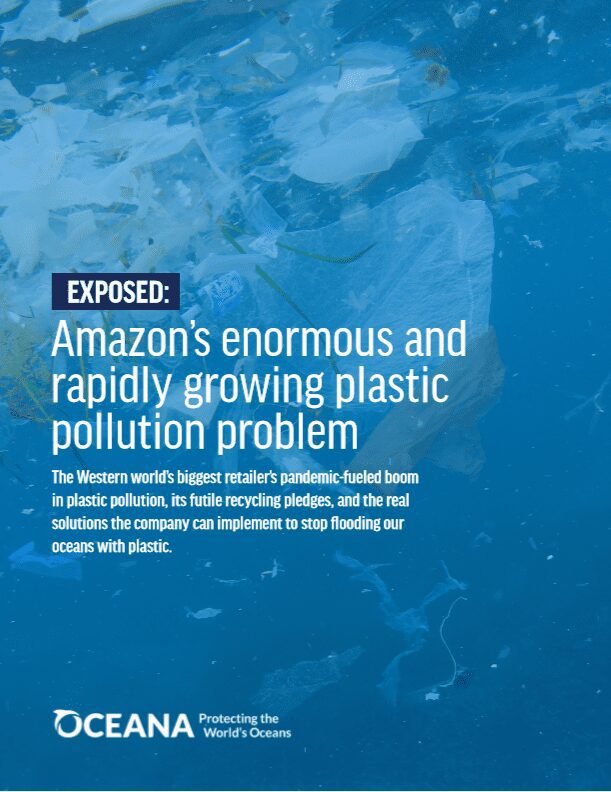Report | December, 2021
Exposed: Amazon’s enormous and rapidly growing plastic pollution problem
Oceana analyzed e-commerce packaging data and found that Amazon generated 599 million pounds of plastic packaging waste in 2020. This is a 29% increase of Oceana’s 2019 estimate of 465 million pounds. The report also found that Amazon’s estimated plastic packaging waste, in the form of air pillows alone, would circle the Earth more than 600 times.
By combining the e-commerce packaging data with findings from a recent study published in Science, Oceana estimates that up to 23.5 million pounds of Amazon’s plastic packaging waste entered and polluted the world’s waterways and oceans in 2020, the equivalent of dumping a delivery van payload of plastic into the oceans every 67 minutes.
Plastic is a major source of pollution and is devastating the world’s oceans. Sea turtles and other ocean animals mistake the kind of plastic used by Amazon as food, which can ultimately prove fatal. Oceana surveyed 1,400 Amazon Prime customers in the United States and the United Kingdom and found that 94.8% are concerned about plastic pollution’s impact on the oceans. 91% said Amazon should reduce its use of plastic packaging. Customers want Amazon and other major online retailers to offer plastic-free packing choices at checkout. More than 740,000 customers and others have signed a petition calling on the company to offer plastic-free choices at Change.org/PlasticFreeChoice.
The report exposes Amazon’s empty recycling promises. Amazon plastic packaging falls into the category of ‘plastic film’ – a material that is extremely difficult to recycle and is not accepted at most curbside recycling programs in the U.S., the UK, and other large markets for Amazon. Oceana sent secret shoppers into 186 of these stores in 25 cities in the U.S. and the UK. Representatives from more than 40% of the stores visited told the secret shoppers they would not accept their Amazon plastic packaging and managers at more than 80% of stores visited did not know Amazon customers were being directed to their stores.
Amazon’s elimination of single-use plastic packaging in India and its increased use of returnable and reusable packaging in that market are helping to reduce plastic pollution. Recently, Amazon has announced plans to eliminate single-use plastic packaging in Germany, one of the company’s largest markets. Amazon could substantially reduce its plastic footprint by taking this approach worldwide.
The rapidly growing plastic pollution crisis needs to be solved by major plastic polluters like Amazon taking steps to reduce plastics. The report calls on Amazon to reduce its plastic footprint by offering plastic-free packaging as an option at checkout, consistently reporting on its plastic footprint, and eliminating plastic packaging.
- Press Release (USA)
- Press Release (UK)
- Press Release (Canada)
- Press Release (Canada -French)
- Press Release (Spain)
- Press Release (Germany)
- Video
- Media Assets
Visit Oceana.org/PlasticFreeAmazon to learn more.
Media contacts:
Gillian Spolarich | gspolarich@oceana.org
Anna Baxter | abaxter@oceana.org


